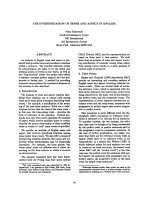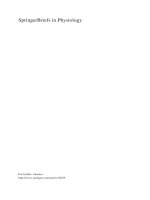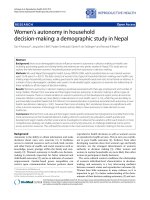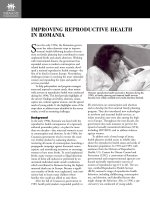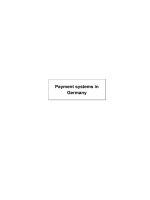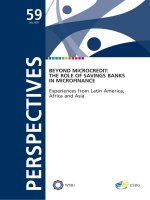Wrong in english6 potx
Bạn đang xem bản rút gọn của tài liệu. Xem và tải ngay bản đầy đủ của tài liệu tại đây (163.57 KB, 6 trang )
DATA
(vi)
Dashes
can
indicate hesitation
in
speech:
I
- er -
don't
-
um
-
know what
-
what
to
say.
(vii)
Dashes
can
indicate
missing letters
or
even
missing
words where propriety
or
discretion
require
it:
c
1
(ship
of the
desert)
Susan
L—
comes
from
Exeter.
He
swore
softly,
'
it'.
data
(plural) datum (singular)
Strictly
speaking,
DATA
should
be
used with
a
plural
verb:
The
DATA
have been collected
by
research students.
You
will, however, increasingly
see
DATA
used with
a
singular verb
and
this
use has now
become
acceptable.
The
DATA
has
been collected
by
research students.
dates
See
NUMBERS
for a
discussion
of how to set out
dates.
deceased
or
diseased?
DECEASED
means dead.
DISEASED
means
affected
by
illness
or
infection.
deceit
(not
-ie)
See
EI/IE
SPELLING
RULE.
deceive
decent
or
descent?
DECENT
means
fair,
upright, reasonable.
DESCENT
means
act of
coming down, ancestry.
decide
decided, deciding (not decied-)
64
DE
LAPIDATED
deciet
Wrong spelling.
See
DECEIT.
decieve
Wrong spelling.
See
DECEIVE.
decision
decolletage
(not
de-)
decrepit
(not
-id)
defective
or
deficient?
DEFECTIVE
means
not
working properly
(a
DEFECTIVE
machine).
DEFICIENT
means lacking something vital
(a
diet
DEFICIENT
in
vitamin
C).
defer
deferred,
deferring, deference
See
ADDING ENDINGS
(iv).
deffinite
Wrong spelling.
See
DEFINITE.
deficient
See
DEFECTIVE
OR
DEFICIENT?.
definate
Wrong spelling.
See
DEFINITE.
definite
(not
-ff-,
not
-ate)
definitely
deisel
Wrong spelling.
See
DIESEL.
delapidated
Wrong spelling.
See
DILAPIDATED.
65
DELUSION
delusion
See
ALLUSION, DELUSION
OR
ILLUSION?.
denouement/denouement
Both
spellings
are
correct.
dependant
or
dependent?
The
adjective (meaning reliant)
is
always
-ent.
She
is a
widow
with
five
DEPENDENT children.
I
am
absolutely
DEPENDENT
on a
pension.
The
noun (meaning someone
who is
dependent)
has
traditionally been spelt
-ant.
However,
the
American
practice
of
writing either
-ant
or
-ent
for the
noun
has
now
spread here. Either spelling
is now
considered correct
for the
noun
but be
aware that
some conservative readers would consider this
slipshod.
She
has five
DEPENDANTS/DEPENDENTS,
descent
See
DECENT
OR
DESCENT?.
describe
(not
dis-)
description
(not
-scrib-)
desease
Wrong spelling.
See
DISEASE.
desert
or
dessert?
A
DESERT
is
sandy.
A
DESSERT
is a
pudding.
desiccated
(not
dess-)
66
t
DEVICE/DEVISE
desirable
(not
desireable)
See
ADDING
ENDINGS
(ii).
desperate
(not
desparate)
The
word
is
derived
from
spes
(Latin
word
for
hope). This
may
help
you to
remember
the e in the
middle
syllable.
dessert
See
DESERT
OR
DESSERT?.
dessiccated
Wrong
spelling.
See
DESICCATED.
destroy
destroyed, destroying (not dis-)
See
ADDING
ENDINGS
(iii).
detached
(not
detatched)
deter
deterred, deterring
See
ADDING
ENDINGS
(iv).
deteriorate
(not
deteriate,
as it is
often
mispronounced)
deterrent
(not
-ant)
develop
developed, developing (not -pp-)
development
(not
developement)
device/devise
DEVICE
is the
noun.
A
padlock
is an
intriguing DEVICE.
67
t
t
t
DIAGNOSIS
DEVISE
is the
verb.
Try
to
DEVISE
a
simple burglar alarm.
diagnosis
(singular) diagnoses (plural)
See
FOREIGN PLURALS.
diagnosis
or
prognosis?
DIAGNOSIS
is the
identification
of an
illness
or a
difficulty.
PROGNOSIS
is the
forecast
of its
likely
development
and
effects.
diarrhoea
diary
(singular) diaries (plural)
See
PLURALS
(iii).
See
DAIRY
OR
DIARY?.
dictionary
(singular) dictionaries (plural)
(not
-nn-)
See
PLURALS (iii).
didn't
(not
did'nt)
See
CONTRACTIONS.
diesel
(not
deisel)
See
EI/IE
SPELLING
RULE.
dietician/dietitian
Both spellings
are
correct.
differcult
Wrong spelling.
See
DIFFICULT.
difference
(not
-ance)
different
(not
-ant)
different
from/to/than
'Different
from'
and
'different
to'
are now
both
t
68
DIRECT
SPEECH
considered acceptable
forms.
My
tastes
are
DIFFERENT
FROM
yours.
My
tastes
are
DIFFERENT
TO
yours.
Conservative
users would, however, much prefer
the
preposition
'from'
and
this
is
widely used
in
formal
contexts.
'Different
than'
is
acceptable
in
American
English
but is not yet
fully
acceptable
in
British English.
difficult
(not
differcult,
not
difficalt)
dilapidated
(not
delapidated)
dilemma
This
word
is
often
used loosely
to
mean
'a
problem'.
Strictly
speaking
it
means
a
difficult
choice
between
two
possibilities.
dinghy
or
dingy?
A
DINGHY
is a
boat (plural
-
dinghies).
See
PLURALS
(iii).
DINGY
means dull
and
drab.
dingo
(singular) dingoes
or
dingos (plural)
dining
or
dinning?
dine
+ ing =
dining
(as in
dining room)
din + ing =
dinning (noise dinning
in
ears)
See
ADDING ENDINGS
(i) and
(ii).
diphtheria
(not
diptheria
as it is
often mispronounced)
diphthong
(not
dipthong
as it is
often mispronounced)
direct
speech
See
INVERTED
COMMAS.
69

